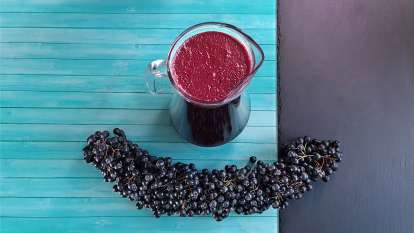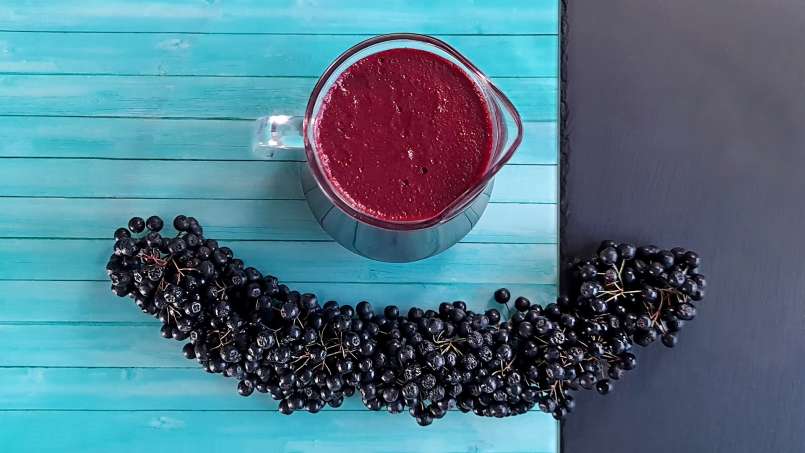Aronia juice with ginger and lemon
Preparation time20 min
Waiting time24 hours
Ready in24 h 20 m
Source of antioxidants
Aronia juice with ginger and lemon: strong antioxidant, strengthens immunity, has a tonic/energizing effect, supports the cardiovascular system, supports cognitive functions, beneficial for those with diabetes, supports the digestive system, supports liver function, helps eyesight, has an anti-inflammatory effect, being recommended for those with rheumatism, it prevents and treats urinary infections.
Servings: 60 servings
I got ~1.8 liters of chokeberry juice, which is about 60 servings per 30ml serving or 36 servings per 50ml serving.
Ingredients
Estimated cost: 9.2 €
Materials
- - fruit and vegetable juicer with screw shaft (40-60 rpm)
- - containers
Preparation
 Preparing the ingredients:
Preparing the ingredients:
→ Aronia fruits (with bunches) are washed in 2-3 waters, more precisely they can be put in a clean sink, let the water flow over them enough to cover them, let them sit in the water 5 - 10 minutes, after which give way to water, until it drains completely. This operation is repeated 2-3 times.
Place the aronia bunches on flat surfaces, on kitchen towels and leave ~ 1 hour to dry to remove excess water.
→ Wash the ginger well, peel it if it is not from organic sources and then cut it into thin slices so that it can be processed by the juicer.
→ Lemons are also washed and peeled. Put the aronia/chokeberries, ginger and lemons through the juicer at the same time. This way we ensure a good homogenization of the ingredients and also help the juicer not to clog the sieve.
Put the aronia/chokeberries, ginger and lemons through the juicer at the same time. This way we ensure a good homogenization of the ingredients and also help the juicer not to clog the sieve. The obtained juice will be stored in glass containers, hermetically closed, mandatory in the refrigerator.
The obtained juice will be stored in glass containers, hermetically closed, mandatory in the refrigerator.
It is recommended to use small bottles (~ 250 ml), to avoid frequent contact with air and light, by opening the bottle several times during the day. It is also good to fill the bottles to the brim to have as little air as possible, thus avoiding oxidation over time.- Although it can be consumed immediately after preparation, it is recommended that the obtained juice stay ~24 hours to macerate in the refrigerator.
 The resulting pulp after squeezing is left to dry and can be used in two ways:
The resulting pulp after squeezing is left to dry and can be used in two ways:
- when preparing teas ~ 2-3 spoons of pulp per 250 ml cup,
- ground/powder, taken as such 1 teaspoon 3 times a day, 30 minutes before meals.
Administration
→ We recommend 30-50 ml (~1-2 tablespoons) of chokeberry juice, 3 times a day, preferably with 30 minutes before meals.
→ It can be consumed as such or diluted in ~200 ml of water. It can also be added to various drinks.
→ It is recommended not to exceed 150 ml of pure juice per day.
→ One or more cures of 2 months with 2 weeks break are recommended!
→ It can be consumed as such or diluted in ~200 ml of water. It can also be added to various drinks.
→ It is recommended not to exceed 150 ml of pure juice per day.
→ One or more cures of 2 months with 2 weeks break are recommended!
Observations
"Aronia juice with ginger and lemon prepared cold, by squeezing with an auger juicer, at low speeds, 40-60 rpm".
⚠ For those who have problems with the strong taste of aronia fruits, a good solution is to include ginger and lemon in the juice.
Storage/Validity:
→ It is recommended to store in small (glass) bottles, necessarily at cold, in the refrigerator.
→ It is recommended to fill the bottles to the top, there should be as little air as possible.
→ If not opened, a bottle of chokeberry juice can be kept in the refrigerator for up to 6 months.
→ After opening a bottle, it is recommended to consume within a maximum of 3 months.
→ We recommend avoiding as much as possible exposure of the juice to air and light, that is, immediately after consuming the recommended dose, close the bottle tightly and put it back in the refrigerator. Thus you avoid oxidation and preserve nutrients for a longer period of time.
A good alternative for preserving this juice is freezing it in ice cube bags:
→ Aronia juice with pollen, ginger and lemon frozen in ice cube bags
→ Aronia juice in ice cubes bags
⚠ For those who have problems with the strong taste of aronia fruits, a good solution is to include ginger and lemon in the juice.
Storage/Validity:
→ It is recommended to store in small (glass) bottles, necessarily at cold, in the refrigerator.
→ It is recommended to fill the bottles to the top, there should be as little air as possible.
→ If not opened, a bottle of chokeberry juice can be kept in the refrigerator for up to 6 months.
→ After opening a bottle, it is recommended to consume within a maximum of 3 months.
→ We recommend avoiding as much as possible exposure of the juice to air and light, that is, immediately after consuming the recommended dose, close the bottle tightly and put it back in the refrigerator. Thus you avoid oxidation and preserve nutrients for a longer period of time.
A good alternative for preserving this juice is freezing it in ice cube bags:
→ Aronia juice with pollen, ginger and lemon frozen in ice cube bags
→ Aronia juice in ice cubes bags
Effects and benefits
General:
- important source of antioxidants: anthocyanins, flavonoids, phenolic acids;
- contains the highest level of anthocyanins and proanthocyanins;
- rich in vitamins: A, B, C, P, K and Q;
- rich in minerals: calcium, magnesium, potassium, iron, zinc and manganese;
- rich in carotene, lutein and catechin;
- tonic / energizing;
- the antibacterial effect;
- immuno-protective
- vitaminizing/mineralizing;
- source of fiber
- regulates the tension;
- regulates blood sugar;
- protects the stomach;
- anti-depressant;
- digestive;
- anti-diarrheal;
- detoxifying;
- anti-aging effect;
- hepato-protective;
- reduces stress;
- protects the body from intoxication;
- rich in protein;
Supports the immune system:
- strengthens the body's immunity (aronia being rich in vitamin C);
- prevents colds and flu (aronia are rich in ellagic acid and myricetin);
- prevents bacterial infections in the respiratory system;
Anti-tumor effects:
- reduces the risk of colon or breast cancer
- fight against free radicals;
- aronia inhibits the growth of cancer cells in colon cancer;
Supports the cardiovascular system:
- chokeberry helps regulate blood pressure due to its high potassium content, which has a dilating effect;
- helps prevent and even treat arteriosclerosis;
- prevents coronary diseases;
- decreases the risk of myocardial infarction;
- effectively cleans the blood;
- reduces triglycerides and bad cholesterol (LDL);
Beneficial for those with diabetes:
- regulates blood sugar (anthocyanins);
- reduces the amount of sugars and fats in the blood thanks to anthocyanins;
- prevents the sudden increase in blood sugar and keeps the sugar level under control, thanks to dietary fiber;
Supports cognitive functions:
- helps increase neural activity;
- helps to strengthen neural connections;
- reduces oxidative stress in the brain (due to anthocyanins);
- prevents depression and anxiety, reduces stress;
- helps prevent neurodegenerative diseases (Alzheimer's, Parkinson's);
- prevents the risk of dementia;
- supports memory and improves learning processes;
Aids vision:
- supports eyesight, chokeberry being rich in carotene (lutein and zeaxanthin, flavonoid antioxidants present in chokeberry);
- prevents eye degeneration;
- reduces oxidative stress in the eyes;
- reduces inflammation in the eyes;
- prevents the development of cataracts;
- improves vision at night (anthocyanins improve micro-circulation and reduce capillary fragility);
Supports the digestive system:
- helps digestion, being rich in fiber;
- fights constipation;
- fights diarrhea;
- protects the intestines from bacteria;
- detoxifies the body;
- helps to lose weight (favors fat burning and increasing muscle mass);
Other:
- helps to combat fatigue;
- prevents and fights allergies;
- contributes to the good functioning of the liver;
- offers extra protection against UV radiation;
- recommended for those with rheumatism and joint pain (cyanidin and anthocyanin);
- prevents and treats urinary infections, thanks to quinic acid;
- reduces the development of E. coli bacteria and Staphylococcus aureus;
- can easily combat nausea thanks to lemon and ginger;
Side effects
- excessive consumption of chokeberry juice can cause stomach upset, nausea or vomiting.
Contraindications
- for pregnant or breastfeeding women only with the doctor's consent;
- it is contraindicated for those with kidney stone problems, as chokeberry contains oxalic acid;
- for those with diabetes, a doctor's recommendation is necessary;
- it is not indicated for people with gastric/duodenal ulcer;
- attention for those with a high degree of coagulation, especially if they are going to have surgical interventions;
Another information
- Important source of antioxidants. Contains the highest level of anthocyanins and proanthocyanidins compared to other already known foods;
- The ORAC test (Oxygen Radical Absorbance Capacity) shows that the antioxidant level of chokeberry fruit is 16062 per 100g;
- Rich in fiber. 100 grams of dried chokeberry = 16.9 grams of fiber;
- Only 100g of chokeberry provides 35% of the daily dose of vitamin C, which supports collagen production, helps immunity and reduces inflammation;
- Rich in vitamin P (the dose is higher than in any other fruit consumed);
- They have chemo-preventive action against colon cancer;
- The ORAC test (Oxygen Radical Absorbance Capacity) shows that the antioxidant level of chokeberry fruit is 16062 per 100g;
- Rich in fiber. 100 grams of dried chokeberry = 16.9 grams of fiber;
- Only 100g of chokeberry provides 35% of the daily dose of vitamin C, which supports collagen production, helps immunity and reduces inflammation;
- Rich in vitamin P (the dose is higher than in any other fruit consumed);
- They have chemo-preventive action against colon cancer;


Comments